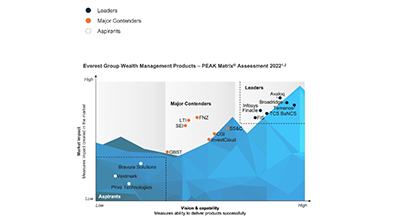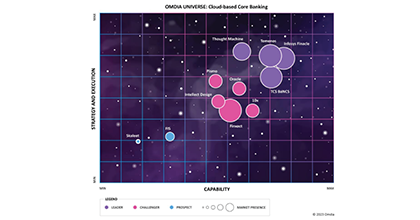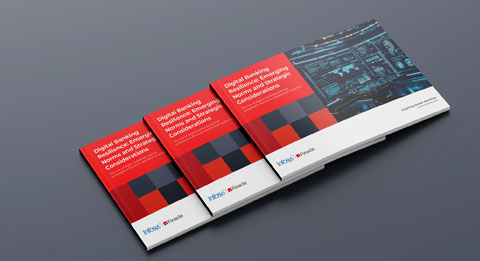-
![]() ESG in bankingESG-conscious banking should create new and future-proof value streams to build a sustainable and resilient business.Read More
ESG in bankingESG-conscious banking should create new and future-proof value streams to build a sustainable and resilient business.Read More -
![Everest Group PEAK Matri Everest Group PEAK Matri]() Everest Group PEAK MatrixA comprehensive solution delivering a full spectrum of wealth products as great experiences. It also improves the productivity of financial advisors and streamlRead More
Everest Group PEAK MatrixA comprehensive solution delivering a full spectrum of wealth products as great experiences. It also improves the productivity of financial advisors and streamlRead More -
![]() Subsidiary of an American Bank in IndonesiaFind out how a leading American bank adapts to a digitalized trade and supply chain finance operations as a part of its larger transformation by leveraging Finacle Trade Finance Solution Suite.Read More
Subsidiary of an American Bank in IndonesiaFind out how a leading American bank adapts to a digitalized trade and supply chain finance operations as a part of its larger transformation by leveraging Finacle Trade Finance Solution Suite.Read More
-
![]() Recomposing Banking: Leading the Digital ContinuumReport gives you a glimpse of the major areas where recomposing banking will create significant impact and value, Infosys Finacle has put together a report on..Read More
Recomposing Banking: Leading the Digital ContinuumReport gives you a glimpse of the major areas where recomposing banking will create significant impact and value, Infosys Finacle has put together a report on..Read More -
![]() Core Banking on Cloud: Navigating to the Fast LaneTake a deep dive into cloud-based core banking and explore the imperatives, opportunities and challenges, and the hallmarks of a robust solution.Read More
Core Banking on Cloud: Navigating to the Fast LaneTake a deep dive into cloud-based core banking and explore the imperatives, opportunities and challenges, and the hallmarks of a robust solution.Read More -
![]() Embracing Payments ComposabilityA step-by-step guide for maximizing Real Time Payment opportunities by embracing Payments Composability...Read More
Embracing Payments ComposabilityA step-by-step guide for maximizing Real Time Payment opportunities by embracing Payments Composability...Read More
-
![]() Shaping Banking’s Next: Banking Technology Trends for 2025 and BeyondThe banking industry has been balancing disruption and opportunity for several years now, and the pace of change shows no signs of slowing as we move into 2025 and beyond.Read More
Shaping Banking’s Next: Banking Technology Trends for 2025 and BeyondThe banking industry has been balancing disruption and opportunity for several years now, and the pace of change shows no signs of slowing as we move into 2025 and beyond.Read More -
![]() Virtual Accounts 2.0: Surpass Conventional Cash Management and Unlock Next-Gen PossibilitiesVirtual Account Management was a groundbreaking shift in the banking landscape, revolutionising use cases like cash concentration, pooling, centralised treasury management, and in-house banking (POBO, ROBO, COBO)Read More
Virtual Accounts 2.0: Surpass Conventional Cash Management and Unlock Next-Gen PossibilitiesVirtual Account Management was a groundbreaking shift in the banking landscape, revolutionising use cases like cash concentration, pooling, centralised treasury management, and in-house banking (POBO, ROBO, COBO)Read More -
![]() Unlocking Hybrid CloudAs banks push forward with their digital transformation agenda, cloud serves as a pivotal enabler. Each bank, at varying stages of adoption, crafts its unique path, dictated by context, regulations, and risk appetite.Read More
Unlocking Hybrid CloudAs banks push forward with their digital transformation agenda, cloud serves as a pivotal enabler. Each bank, at varying stages of adoption, crafts its unique path, dictated by context, regulations, and risk appetite.Read More
-
![]() Banking on CloudThis report from Infosys Finacle delves into the need for accelerating cloud adoption, highlights the current state of the industry, and puts forth key recommenRead More
Banking on CloudThis report from Infosys Finacle delves into the need for accelerating cloud adoption, highlights the current state of the industry, and puts forth key recommenRead More -
![]() Omdia Universe | Cloud-based Core BankingIn the report, Omdia highlights the following key capabilities of leading cloud-based core banking providers:Read more
Omdia Universe | Cloud-based Core BankingIn the report, Omdia highlights the following key capabilities of leading cloud-based core banking providers:Read more
-
![]() Emirates NBDEmirates NBD consolidates its operations on a single version for scalability, agility, and standardization.Read More
Emirates NBDEmirates NBD consolidates its operations on a single version for scalability, agility, and standardization.Read More -
![]() A Global Top 5 BankDiscover how a global top 5 bank headquartered in the US accelerated payments transformation.Read More
A Global Top 5 BankDiscover how a global top 5 bank headquartered in the US accelerated payments transformation.Read More -
![]() Union Bank of IndiaUnion Bank of India launches Union Virtual Connect (UVConn) by leveraging WhatsApp to provide customers personalized banking services.Read More
Union Bank of IndiaUnion Bank of India launches Union Virtual Connect (UVConn) by leveraging WhatsApp to provide customers personalized banking services.Read More

Harnessing the Power of Next-Gen AI for Banking
Blogs
Harnessing the Power of Next-Gen AI for Banking
December 11, 2023
Rajashekara V. Maiya Head of Business Consulting, Infosys Finacle
The Leap From AI to Generative AI
The introduction of ChatGPT, a language model developed by OpenAI, revolutionized the evolving landscape of artificial intelligence (AI), profoundly impacting how we communicate, access information, and interact with technology.
While not an entirely new concept, generative AI marks a significant advancement from traditional AI systems, enabling machines to not only recognise patterns but also generate new content that closely resembles human creations.
Generative AI or Gen AI utilises large language models (LLMs) to automate tasks and produce human-like content, advancing from rule-based systems to creative data-driven models.
Generative AI in Banking
Generative AI can potentially supercharge banks’ operations, enhancing efficiency, improving customer experiences, and driving growth.
According to a McKinsey report on generative AI, banking is one of the top industries that could experience an annual revenue impact of $200 – $340 billion by implementing various use cases. Leading banking and financial institutions like ABN Amro, BBVA, and Goldman Sachs are already experimenting with several use cases for generative AI, such as marketing, loan processing, credit analysis, and debt collection.
A Look at Some Impactful Gen AI Use Cases in Banking
Customer support: Generative AI models like ChatGPT are a promising replacement for traditional chatbots in customer support. Banks have deployed chatbots for several years but with limited capabilities in queries and responses. With its ability to comprehend context, generate human-like responses, and adapt to various conversational scenarios, Gen AI significantly improves chat-based interactions, paving the way for more engaging and effective communication between humans and AI-powered systems. Plus, a model like ChatGPT, with more than 200 billion communication parameters, makes it more powerful, given the sheer number of permutations and combinations.
Personalised financial advice: By analysing vast amounts of customer data, including transaction history, spending patterns, and investment preferences, generative AI algorithms can generate customised and richer recommendations for products and services that align with individual customer needs.
Compliance and regulatory reporting: Being heavily regulated, banks must adhere to stringent compliance requirements and reporting standards. Banks can automate compliance checks and streamline regulatory reporting processes by employing AI-powered systems. Since generative AI models adapt and evolve rapidly, this reduces the chances of errors and inaccuracies and ensures that banks remain compliant with changing regulations.
Language support across geographies: Generative AI models, such as ChatGPT, offer language translation services for banks with a global reach or presence. They can accurately translate documents for marketing, sales, training, and compliance purposes, ensuring that the intended meaning and ethos of the content are preserved even for customers or employees who are not fluent in the bank’s primary language.
Other use cases include customer onboarding, risk management, and fraud detection, where generative AI can deliver considerable value.
Is the Future Smooth Sailing for Generative AI?
As generative AI becomes more prevalent in business and consumer applications, ensuring sufficient computing capacity to support them will be a significant challenge. LLMs such as GPT-3 also demand substantial computational power, leading to high energy consumption. The massive data centres and computing resources required to train and operate these models can contribute to increased carbon emissions and environmental impact, posing a problem for ESG-conscious banks.
The potential impact of gen AI on employment and job displacement is another concern. GPT-4, OpenAI’s newest version, is reportedly the most aligned to human values, skills, and creativity. Banks need to work toward augmenting the skills of their workforce with rebadging and reskilling to thrive in the era of AI. With high regulatory scrutiny for banks, ensuring that AI-generated content adheres to ethical guidelines and is not used maliciously is essential for building trust and maintaining responsible AI practices.
Using Gen AI, the Responsible Way
Despite the challenges, the future of generative AI is brimming with possibilities, potentially redefining how we live and work. From creating realistic virtual worlds to generating personalised content, the capabilities of generative AI are vast and ever-expanding. The technology is rapidly gaining traction in the financial services sector. It is a valuable tool to generate new data, obtain meaningful insights for making informed financial decisions, and much more.
Striking the right balance between innovation, ethical considerations, and responsible deployment will be essential to harness the full potential of generative AI for the benefit of society. As research and development in AI continue to progress, we can expect generative AI to have a profound and transformative impact on various aspects of our lives in the years to come.
This article was first published in CXO Today.
Rajashekara Maiya is responsible for charting Finacle’s product strategy and defining its product roadmap, strategic acquisitions, alliance partnerships, and client engagements. He represents the company while interacting with external stakeholders such as analysts and the media. He is also responsible for the business consulting practice at Finacle, Eco-system innovation Group along with Cloud, Blockchain business. He has played several roles across diverse areas, including product management, solution architecture, implementation, and pre-sales over the last 20 years at Infosys. Maiya has been instrumental in the conceptualization and planning of Finacle Enterprise – the latest addition to the Finacle portfolio designed to deliver simplified transformation and progressive modernization capabilities to global banks. Maiya specializes in core banking, risk management, regulations, and compliance. He has been quoted on these and other topics in reputed publications such as Forbes, The Banker, Banking Technology, The Economist, Business Line, BBC Radio, and the Economic Times. He is on the expert panel of the McKinsey Quarterly; is a member of the XBRL Abstract Modelling Task Force (AMTF) Group, MIT Technology Review Global Panel; and is an Associate member of the Institute of Chartered Accountants of India. Maiya holds several patents and has pending patents in the areas of partner portals, delivery channels, offline banking, and customer experience. Maiya is also a co-author of the book called ‘SMACing the Bank’.


©2025 -Edgeverve Systems Limited | All rights reserved

















